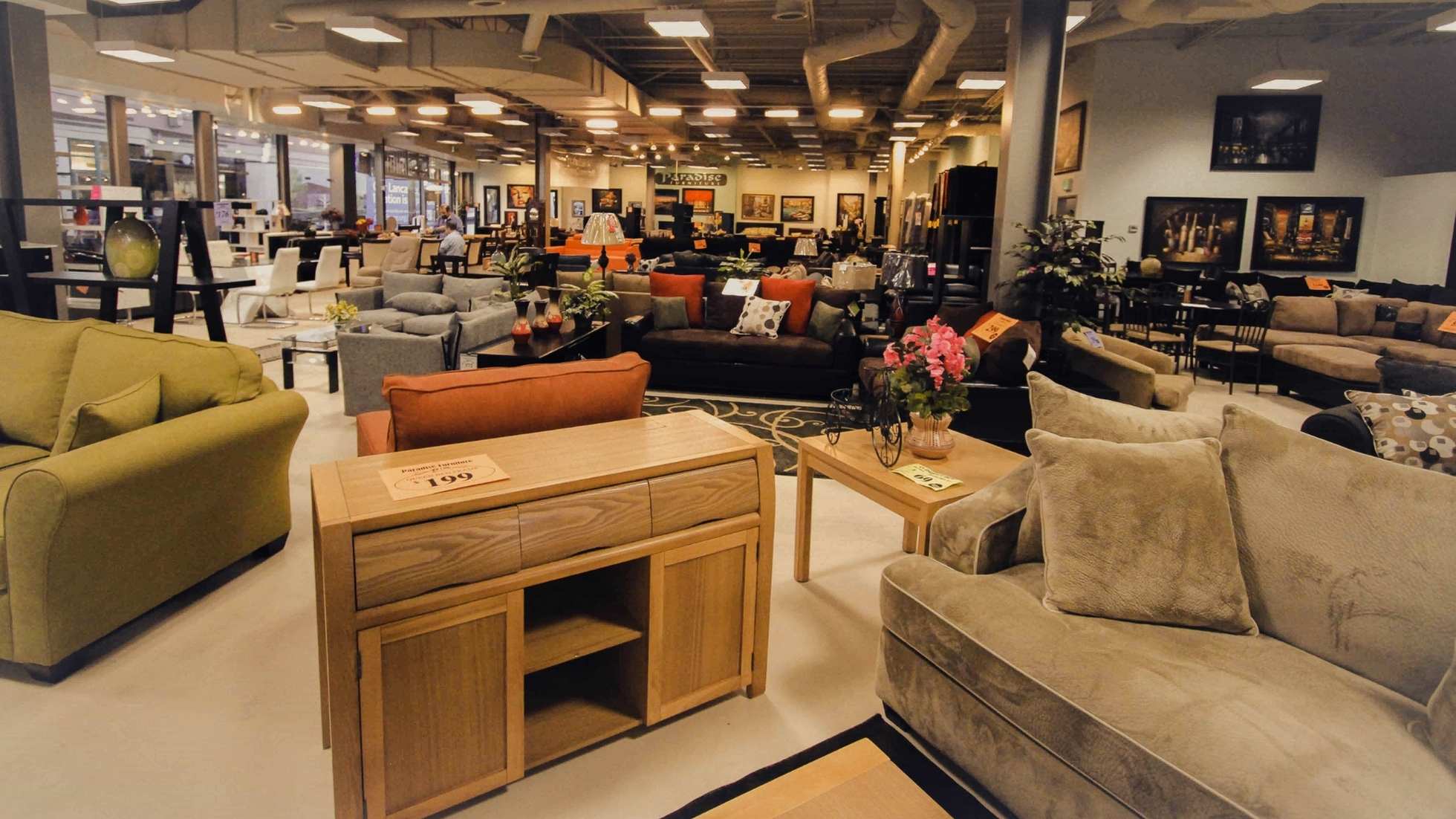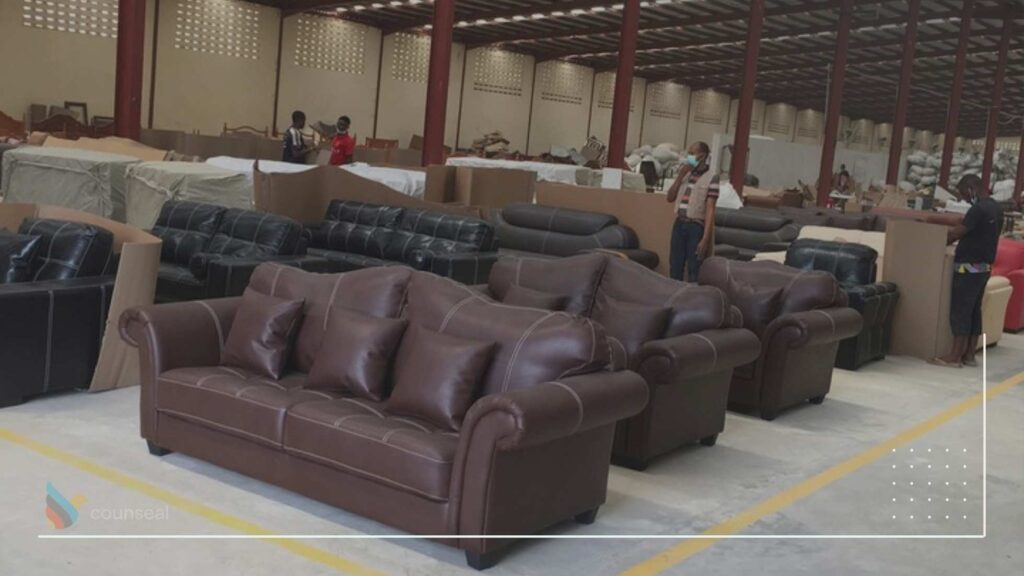How to Start a Furniture Business in Nigeria: Complete Guide

by Counseal Team
Updated July 24, 2024

Starting a furniture business in Nigeria is an entrepreneurial venture worth exploring.
The country’s booming construction and real estate industries, coupled with a growing middle class, have created a robust market for quality furniture. As a result, the furniture business in Nigeria has evolved into a lucrative industry with significant profit potential.
With a focus on practical tips and real-life success stories in this article, we aim to provide you with valuable insights to help you launch and grow your furniture business in Nigeria.
Quick Takes
How much does it cost to start this business?
The cost of starting a furniture business in Nigeria varies depending on the size of the business and the location. However, it can range from ₦500,000 to ₦10,000,000. Some of the factors that affect the cost are:
The cost of structuring your business (registration, business consulting, etc)
The cost of getting relevant licence and permits from the government
The cost of renting or acquiring a workshop and showroom
The cost of equipment and raw materials
Running cost
Salary expenses
Marketing and advertising expenses
Cost of creating a website or drafting a business plan (if you cannot do them yourself)
Cost of training
With 2-3 million Naira in place, you should be able to get your furniture business up and running. However, some sources suggest that you may need up to 50 million Naira to start a local furniture business of a larger scale.
How much can you make per month?
The amount of money you can make per month from a furniture business in Nigeria depends on various factors, such as;
the size of your business,
the quality of your products,
the demand for your products,
the location of your business, and
the level of competition in the market.
However, The average profit margin for a furniture business in Nigeria is around 20%. This means that if your revenue is ₦1,000,000 per month, your profit would be ₦200,000 per month. Of course, this is just an estimate and your actual profit may vary depending on your expenses and sales volume.
To increase your profit, you can try to reduce your costs, improve your product quality, expand your market reach, and differentiate yourself from your competitors. You can also use online platforms and social media to promote your business and attract more customers.
Additionally, you can diversify your product range and offer custom-design furniture to meet the specific needs and preferences of your customers.
What is the minimum required to start this business?
The minimum required to start a furniture business in Nigeria depends on whether you are a local or a foreign investor, and whether you want to start a small-scale or a large-scale business.
The minimum capital for a local furniture business in Nigeria is around ₦500,000, while the minimum capital for a foreign-owned furniture business in Nigeria is ₦10,000,000. However, you may need up to ₦50,000,000 to start a local furniture business of a larger scale .
Therefore, the minimum required to start a furniture business in Nigeria can vary from ₦500,000 to ₦50,000,000, depending on your goals and resources. You should also consider other costs such as renting or acquiring a workshop and showroom, buying equipment and raw materials, paying salaries and taxes, marketing and advertising, etc.
What are the best states to start this business?
There are many factors to consider when choosing the best states to start a furniture business in Nigeria, such as;
the market size,
the demand,
the competition,
the infrastructure,
the security, and
the government policies.
Here are some of the states that are recommended for starting a furniture business in Nigeria:
Lagos: Lagos is the most populous and cosmopolitan city in Nigeria, with a large and diverse market for furniture. Lagos also has better infrastructure, business support, and a well-connected ecosystem than many other states. Lagos accounts for 90% of the country’s foreign trade flow and contributes more than 30% of Nigeria’s GDP. However, Lagos also has high competition, high cost of living, and high security risks.
Anambra: Anambra is one of the leading states in furniture production and exportation in Nigeria. Anambra has a rich history and culture of furniture making, with skilled craftsmen and artisans. Anambra also has a large market for furniture, especially in the commercial city of Onitsha. Anambra has a relatively stable security situation and a supportive government that offers incentives and grants to furniture businesses. However, Anambra also has poor infrastructure, high transportation costs, and low access to raw materials.
Ogun: Ogun is another state that is known for its furniture industry, especially in the industrial city of Sango Ota. Ogun has a strategic location, as it is close to Lagos and the international airport. Ogun also has a large market for furniture, as it serves as a gateway to other states in the southwest region. Ogun has a relatively good infrastructure, security, and power supply. Ogun also has a friendly business environment, as it offers tax relief and land allocation to furniture businesses. However, Ogun also has high competition, high cost of production, and low access to skilled labour.
These are some of the states that are considered to be the best for starting a furniture business in Nigeria, but you should also do your own research and feasibility study before making a final decision. You should also consider your niche, your target audience, your budget, and your goals when choosing a state to start your business.
What are the known examples of this business?
There are many examples of furniture businesses in Nigeria, both local and foreign. Some of them are:
HOG Furniture: This is one of the leading furniture suppliers in Nigeria, offering a wide range of products such as office furniture, home furniture, school furniture, hotel furniture, and outdoor furniture. They also provide interior design and installation services.
Interior Woodwork: This is a furniture company that specialises in custom-made furniture for residential and commercial spaces. They use high-quality materials and skilled craftsmen to create unique and durable furniture.
BEDMATE FURNITURE NIGERIA: This is a subsidiary of Bedmate Furniture Group, which is the largest furniture company in China. They have been operating in Nigeria since 2003, and have several showrooms across the country. They offer modern and elegant furniture for living rooms, bedrooms, dining rooms, and offices.
THE CHAIR CENTRE LIMITED: This is a furniture company that focuses on office furniture, such as chairs, desks, cabinets, and partitions. They also produce home furniture, such as sofas, beds, and tables. They have a reputation for quality and innovation, and have won several awards and recognitions.
LIFEMATE FURNITURE NIGERIA: This is another subsidiary of Bedmate Furniture Group, which caters to the high-end market segment. They offer luxury and premium furniture for homes, hotels, and offices. They also provide interior design and consultancy services.
Step 1: Understanding the Furniture Business in Nigeria

In Nigeria, the furniture industry is a thriving sector, with a range of business models catering to diverse customer needs. In this article, we’ll explore four key types of furniture enterprises commonly found in Nigeria: traditional furniture stores, online furniture retailers, bespoke furniture makers, and second-hand furniture sellers. We’ll assess the pros and cons of each, to help you decide which type of furniture business could best serve your needs.
Traditional Furniture Stores
Traditional furniture stores, often large showrooms, are the oldest and most common type of furniture business in Nigeria. They offer customers the opportunity to view, touch, and test furniture before making a purchase.
Pros:
- The tactile experience enables customers to assess the quality and comfort of furniture first-hand.
- Sales staff can provide immediate assistance and product information.
Cons:
- These stores usually have high overhead costs due to rent and staffing, which can lead to higher prices.
- They may offer a limited range of products due to space constraints.
Online Furniture Retailers
Online furniture retailers such as Jiji and Konga have become increasingly popular in Nigeria. They display their products on a digital platform, allowing customers to browse and buy furniture from the comfort of their homes.
Pros:
- Online retailers often offer a broader range of products.
- They often offer competitive prices due to lower overhead costs.
Cons:
- Customers can’t physically inspect the furniture before purchase.
- Delivery may be delayed, and return policies can be strict.
Bespoke Furniture Makers
Bespoke furniture makers customise furniture to the specific requirements of the customer. This model is common in Nigeria, where many customers desire unique, tailored pieces.
Pros:
- Customers can get furniture that matches their exact requirements.
- Bespoke furniture tends to be high-quality and durable.
Cons:
- Bespoke furniture can be significantly more expensive.
- Production and delivery times can be lengthy.
Second-Hand Furniture Sellers
Second-hand furniture sellers offer used furniture at lower prices. This model is popular among budget-conscious customers and those looking for vintage pieces.
Pros:
- Second-hand furniture is often more affordable.
- It offers an opportunity to find unique, vintage pieces.
Cons:
- The condition and quality of second-hand furniture can be unpredictable.
- There’s usually no warranty or return policy for second-hand items.
In conclusion, each type of furniture business in Nigeria has its distinct advantages and drawbacks, and the best choice depends on your specific needs and preferences. Whether you prize convenience, customisation, cost savings, or the chance to try before you buy, there’s a furniture business model in Nigeria to suit you.
Step 2: Starting a Furniture Business in Nigeria

Business Planning
Understanding the significance of a well-structured business plan cannot be overstated. A business plan is essentially a blueprint that guides your business from the startup phase through establishment and eventual business growth. It is a must-have for all new businesses.
Let’s delve into creating a business plan specifically for a furniture business. Here are the key elements to consider:
- Executive Summary: A brief overview of your business – its name, location, the products you intend to sell, and your mission statement.
- Company Description: Detailed information about your company, the problems it solves, and the target market it caters to.
- Market Analysis: An in-depth look at your industry and competition.
- Organisation and Management: Your business structure, management team, and information about the ownership of the company.
- Services or Products: What you’re selling or the service you’re offering.
- Marketing and Sales Strategy: How you’ll attract and retain customers.
- Funding Request & Financial Projections: Detailed information on your funding requirements, financial projections, and strategies to achieve these projections.
- Appendix: Any additional supporting documents.
Let’s look at a concise sample for a hypothetical furniture business named “Comfort Creations”:
- Executive Summary: Comfort Creations aims to provide high-quality, locally made furniture to residents of Lagos, Nigeria.
- Company Description: Comfort Creations specialises in handcrafted furniture, combining traditional Nigerian craftsmanship with modern designs.
- Market Analysis: The Nigerian furniture market is expected to grow by 5.2% over the next five years. Our main competitors are XYZ and ABC.
- Organisation and Management: Comfort Creations is a proprietorship, owned and managed by Mr. John Doe.
- Services or Products: We offer a range of handcrafted furniture including sofas, dining sets, and beds.
- Marketing and Sales Strategy: We plan to leverage social media marketing, local advertising, and partnerships with local interior designers to attract and retain customers.
- Funding Request & Financial Projections: We require ₦10 million to start, expecting to break even in the second year and profit from the third year onwards.
- Appendix: (To include any relevant certifications, contracts, etc.)
Starting a furniture business in Nigeria is a promising prospect given the growing demand for locally made, high-quality furniture.
With a solid business plan, you’re already one step closer to success. Go to our free tool Click [here] (https://counseal.com/business-plan/) to generate a quick and comprehensive business plan.
Funding Your Furniture Business
Starting a furniture business in Nigeria? It’s no small task. Between securing a workspace, sourcing materials, and hiring skilled craftsmen, the financial requirements can be quite substantial. Thankfully, a multitude of funding options are available to prospective business owners. We will explore these avenues, discussing their respective benefits and drawbacks to help you make an informed choice.
Personal Savings
Personal savings is often the first port of call for many aspiring entrepreneurs. It offers full control over your funds and eliminates the need to pay back a loan with interest. However, the downside is that it places all the financial risk squarely on your shoulders. If the business fails, you stand to lose your entire investment.
Bank Loans
Banks in Nigeria offer different types of loans for small businesses. The upside is that they can provide large amounts, and you don’t need to share your profits with anyone. However, these loans typically come with high interest rates, and the repayment periods can be quite stringent.
Angel Investors
Angel investors are individuals who provide capital for a business in exchange for a percentage of ownership or convertible debt. They can also offer valuable mentorship and business advice. However, this means you’ll have to share your profits and decision-making power.
Crowdfunding
Crowdfunding platforms allow you to raise funds from multiple people. This method can tap into the collective efforts of friends, family, and other like-minded individuals. The downside is that it can be challenging to raise significant amounts unless your business idea goes viral.
Venture Capital
Venture Capital firms provide funding in return for equity. They also offer mentorship and access to their network of contacts. However, like angel investors, this means giving up a portion of your ownership and control.
Government Grants and Schemes
The Nigerian government offers various grants and schemes to support small businesses. These funds do not need to be paid back, making them an attractive option. However, the application process can be complex and time-consuming.
Trade Credit
Trade credit involves buying supplies on credit from your vendors. It’s an excellent way to manage cash flow since you only pay when you sell your furniture. However, not all suppliers offer this option, and late payments can damage your credit score.
The best funding option depends on your specific circumstances, such as your risk tolerance, funding needs, and long-term business goals. It’s advisable to consult with a financial advisor before making your decision. Remember, securing funding is only the first step. The real work begins with turning your furniture business into a success story on the Nigerian business landscape.
Setting Up Your Furniture Business
Establishing a furniture business in Nigeria presents a rewarding opportunity, given the ever-growing demand for quality furniture.
Firstly, let’s delve into the requirements for setting up a furniture business in Nigeria.
A keen understanding of the furniture market,
a well-crafted business plan, sufficient capital, and
a skilled workforce; are crucial to your enterprise’s success.
Additionally, securing a suitable location for your showroom and workshop is essential, and so is an understanding of the latest furniture trends.
Next, we turn to the process of registering your furniture business in Nigeria. The Corporate Affairs Commission (CAC) is the regulatory body responsible for business registration. The procedure involves choosing a unique business name, filling out the necessary forms, paying the appropriate fees, and providing the required documents. Once approved, you will receive a Certificate of Incorporation, which will legally validate your business.
Lastly, we provide a checklist for your furniture business setup. This includes:
Conducting market research and creating a business plan.
Securing capital through savings, loans, or investors.
Registering your business with the CAC.
Hiring skilled craftsmen and other necessary staff.
Sourcing quality materials and equipment
Setting up your showroom and workshop.
implementing a robust marketing strategy to promote your business.
In conclusion, setting up a furniture business in Nigeria, while it may seem daunting, can be systematically tackled with the right approach and adequate preparation. Always remember, the key to a successful business is not only about selling a product or service but also about providing a solution that meets the needs of your customers.
Marketing Your Furniture Business
In the competitive world of the furniture business, marketing remains critical to success. It’s not merely about showcasing your products and services, but more about creating awareness, influencing decisions, and building long-term relationships with your customers.
Creating a marketing plan for your furniture business requires strategic thinking.
Start by identifying your target client base. Are they homeowners, real estate developers, or commercial entities? Once determined, you can tailor your marketing strategies to appeal to these specific groups.
Researching your competition also forms a crucial part of your marketing plan. By understanding what they offer and their strategies, you’ll be better equipped to differentiate your brand and offer unique selling propositions.
There are numerous successful marketing strategies for furniture businesses in Nigeria that you can draw inspiration from.
For instance, Lifemate Furniture has leveraged digital marketing, harnessing the power of social media platforms to reach wider audiences. By regularly posting high-quality images of their products and providing engaging content, they have managed to attract a substantial online following.
Similarly, Vava Furniture utilises both online and offline marketing strategies. They have a well-structured website with an online catalogue, allowing potential customers to browse through their offerings at their convenience. Additionally, they run regular print media ads and participate in trade shows to reach a broader audience.
In conclusion, marketing is vital for the success of your furniture business. It helps create brand awareness, attract potential customers, and foster customer loyalty. By crafting a carefully thought-out marketing plan and learning from successful businesses, you can carve out your niche in Nigeria’s competitive furniture industry.
Step 3: Growing Your Furniture Business in Nigeria

In Nigeria, the furniture business presents a vast array of growth opportunities. This section aims to outline various strategies for expansion, and delve into the advantages and potential drawbacks of each method. By providing a balanced view, we hope to equip you with the necessary insights to make an informed decision about the most suitable expansion route for your unique business situation.
Different ways to expand your furniture business in Nigeria include:
- Diversification of Product Range: This involves adding new furniture products that cater to a wider audience. It’s advantageous as it can attract new customers and broaden your market reach. However, it may require significant investment in new materials and manufacturing processes.
- Opening New Stores: This strategy can dramatically increase your business’s visibility and customer base. The downside is the high cost of renting or buying new premises, along with the additional operational expenses.
- Franchising: This allows others to operate stores under your business name. While this can lead to rapid expansion with less capital outlay, it demands robust systems and controls to ensure brand consistency.
- Online Expansion: Setting up an online store on your own website or through e-commerce platforms can extend your reach beyond geographical constraints. It is cost-effective but requires effective digital marketing strategies to drive traffic and sales.
- Partnerships: Collaborating with other businesses can offer access to new customers and resources. The key is to find partners that complement your business. The downside is potential conflicts and sharing of profits.
Each expansion option has its own set of pros and cons, and what works best will depend on your specific business model, resources, and long-term goals. As you contemplate your next step, consider the financial implications, potential return on investment, and alignment with your business vision. Remember, strategic growth involves making considered decisions that balance risk with reward.
Challenges of Running a Furniture Business in Nigeria

Running a furniture business in Nigeria comes with a unique set of challenges. These challenges range from infrastructural deficiencies to market penetration and supply chain disruptions. Understanding these challenges and knowing how to overcome them can spell the difference between success and failure.
One of the primary challenges faced by furniture businesses in Nigeria is the lack of a reliable power supply. Frequent power cuts and the high cost of alternative power sources can hamper operations and increase production costs. Overcoming this challenge often requires significant investment in alternative power sources, such as generators or solar panels.
Another major challenge is the high cost of raw materials. The price of wood, a major input in furniture production, has been on the rise in recent years. This increase in cost often translates into higher prices for finished products, making them less attractive to price-sensitive consumers. Furniture businesses can navigate this by sourcing materials locally where possible and negotiating better deals with suppliers.
Market penetration is another hurdle. Breaking into an already saturated market can be daunting. Furniture businesses need to find a unique selling proposition to stand out from the crowd. For instance, they could focus on eco-friendly products or offer customised solutions.
Despite these challenges, some furniture businesses in Nigeria have managed to achieve success. A notable example is Ile.Ila, a furniture design and manufacturing company that has overcome these challenges by focusing on locally sourced materials and sustainable practices. They have also invested in a robust marketing strategy to effectively reach their target market.
While running a furniture business in Nigeria comes with its fair share of challenges, they are not insurmountable. With the right strategies and a thorough understanding of the market, businesses can thrive and make a significant impact on the Nigerian economy.
For instance, Ile.Ila, a successful furniture design and manufacturing firm, has navigated these hurdles by focusing on locally sourced materials, sustainable practices, and robust marketing strategies
In conclusion, the Nigerian furniture market offers immense potential for aspiring entrepreneurs. By understanding the market, offering high-quality products, and leveraging digital platforms, you can carve out your niche in this lucrative industry. So, why wait? Begin your entrepreneurial journey today and tap into this potential. Remember, the journey of a thousand miles begins with a single step.
Your journey to becoming a successful furniture business owner in Nigeria starts now. Good luck!
Frequently Asked Questions
What are the costs involved in starting a furniture business in Nigeria?
Starting a furniture business in Nigeria requires a significant capital investment. The costs involved include the cost of structuring your business, the cost of getting relevant licences and permits from the government, the cost of renting or acquiring a workshop and showroom, the cost of equipment and raw materials, running costs, salary expenses, marketing and advertising expenses, and the cost of creating a website or drafting a business plan (if you cannot do them yourself). With 2-3 million Naira in place, you should be able to get your furniture business up and running.
What are the different types of furniture businesses in Nigeria?
There are different types of furniture businesses in Nigeria, including custom-design furniture businesses, furniture retail stores, furniture manufacturing businesses, and furniture repair and restoration businesses.
How can I fund my furniture business in Nigeria?
There are different ways to fund a furniture business in Nigeria, including personal savings, bank loans, grants, and venture capital.
What are the requirements for setting up a furniture business in Nigeria?
The requirements for setting up a furniture business in Nigeria include registering your business with the Corporate Affairs Commission of Nigeria (CAC), obtaining relevant licences and permits from the government, renting or acquiring a workshop and showroom, and acquiring the necessary equipment and raw materials.
How can I market my furniture business in Nigeria?
Marketing is essential for a furniture business in Nigeria. You can create a marketing plan for your furniture business by identifying your target audience, creating a brand identity, using social media platforms, attending trade shows and exhibitions, and offering discounts and promotions.
What are the challenges of running a furniture business in Nigeria?
The challenges of running a furniture business in Nigeria include high competition, lack of access to funding, poor infrastructure, and the high cost of raw materials and equipment.
How can I expand my furniture business in Nigeria?
There are different ways to expand a furniture business in Nigeria, including opening new showrooms, expanding your product line, exporting your products to other countries, and partnering with other businesses.





